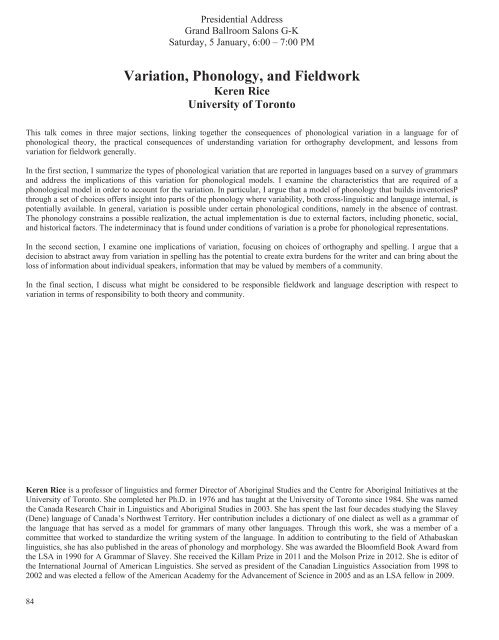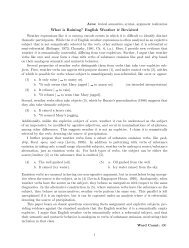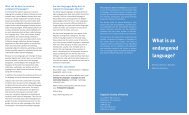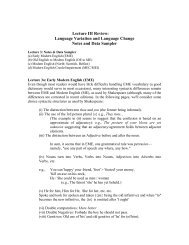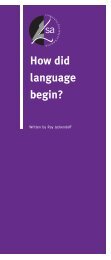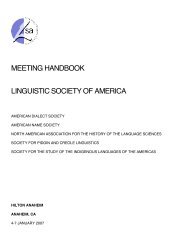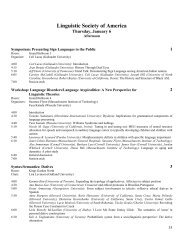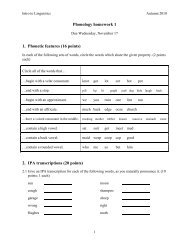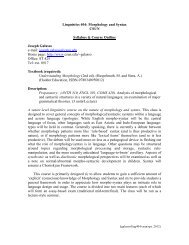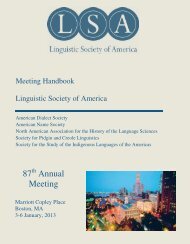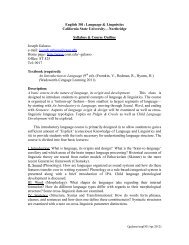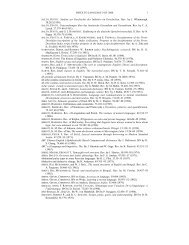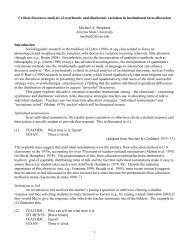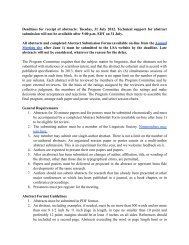here - Linguistic Society of America
here - Linguistic Society of America
here - Linguistic Society of America
You also want an ePaper? Increase the reach of your titles
YUMPU automatically turns print PDFs into web optimized ePapers that Google loves.
Presidential AddressGrand Ballroom Salons G-KSaturday, 5 January, 6:00 7:00 PMVariation, Phonology, and FieldworkKeren RiceUniversity <strong>of</strong> TorontoThis talk comes in three major sections, linking together the consequences <strong>of</strong> phonological variation in a language for <strong>of</strong>phonological theory, the practical consequences <strong>of</strong> understanding variation for orthography development, and lessons fromvariation for fieldwork generally.In the first section, I summarize the types <strong>of</strong> phonological variation that are reported in languages based on a survey <strong>of</strong> grammarsand address the implications <strong>of</strong> this variation for phonological models. I examine the characteristics that are required <strong>of</strong> aphonological model in order to account for the variation. In particular, I argue that a model <strong>of</strong> phonology that builds inventoriesPthrough a set <strong>of</strong> choices <strong>of</strong>fers insight into parts <strong>of</strong> the phonology w<strong>here</strong> variability, both cross-linguistic and language internal, ispotentially available. In general, variation is possible under certain phonological conditions, namely in the absence <strong>of</strong> contrast.The phonology constrains a possible realization, the actual implementation is due to external factors, including phonetic, social,and historical factors. The indeterminacy that is found under conditions <strong>of</strong> variation is a probe for phonological representations.In the second section, I examine one implications <strong>of</strong> variation, focusing on choices <strong>of</strong> orthography and spelling. I argue that adecision to abstract away from variation in spelling has the potential to create extra burdens for the writer and can bring about theloss <strong>of</strong> information about individual speakers, information that may be valued by members <strong>of</strong> a community.In the final section, I discuss what might be considered to be responsible fieldwork and language description with respect tovariation in terms <strong>of</strong> responsibility to both theory and community.Keren Rice is a pr<strong>of</strong>essor <strong>of</strong> linguistics and former Director <strong>of</strong> Aboriginal Studies and the Centre for Aboriginal Initiatives at theUniversity <strong>of</strong> Toronto. She completed her Ph.D. in 1976 and has taught at the University <strong>of</strong> Toronto since 1984. She was namedthe Canada Research Chair in <strong>Linguistic</strong>s and Aboriginal Studies in 2003. She has spent the last four decades studying the Slavey(Dene) language <strong>of</strong> Canadas Northwest Territory. Her contribution includes a dictionary <strong>of</strong> one dialect as well as a grammar <strong>of</strong>the language that has served as a model for grammars <strong>of</strong> many other languages. Through this work, shewasamember<strong>of</strong>acommittee that worked to standardize the writing system <strong>of</strong> the language. In addition to contributing to the field <strong>of</strong> Athabaskanlinguistics, she has also published in the areas <strong>of</strong> phonology and morphology. She was awarded the Bloomfield Book Award fromthe LSA in 1990 for A Grammar <strong>of</strong> Slavey. She received the Killam Prize in 2011 and the Molson Prize in 2012. She is editor <strong>of</strong>the International Journal <strong>of</strong> <strong>America</strong>n <strong>Linguistic</strong>s. She served as president <strong>of</strong> the Canadian <strong>Linguistic</strong>s Association from 1998 to2002 and was elected a fellow <strong>of</strong> the <strong>America</strong>n Academy for the Advancement <strong>of</strong> Science in 2005 and as an LSA fellow in 2009.84


